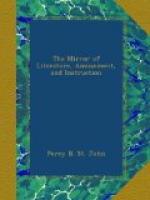“No resistance,” I said, “or I will cleave your skull in two.”
At this threat he seemed in a dream; but when he knew that he was gripped by that iron hand which had subdued the most vigorous malefactors, he was convinced that it was no vision. Moiselet was as quiet as a lamb. I had sworn not to leave him, and kept my word. During the journey to the station of the brigade of gendarmerie, where I deposited him, he frequently cried out,
“I am done—who could have thought it? and he had such a simple look too!”
At the assizes of Versailles, Moiselet was sentenced to six months’ solitary confinement.
M. Senard was overpowered with joy at having recovered his hundred thousand crowns worth of diamonds. Faithful to his system of abatement, he reduced the reward one-half; and still there was difficulty in getting five thousand francs from him, out of which I had been compelled to expend more than two thousand: in fact, at one moment I really thought I should have been compelled to bear the expenses myself.
* * * * *
SPIRIT OF THE PUBLIC JOURNALS
THE TOYMAN IS ABROAD.
“En fait d’inutilites, il ne faut que le necessaire.”
CHAMPFORT.
There is no term in political philosophy more ambiguous and lax in its meaning than Luxury. In Ireland, salt with a potato is, by the peasant, placed in this category. Among the Cossacks, a clean shirt is more than a luxury—it is an effeminacy; and a Scotch nobleman is reported to have declared, that the act of scratching one’s self is a luxury too great for any thing under royalty. The Russians (there is no disputing on tastes) hold train-oil to be a prime luxury; and I remember seeing a group of them following an exciseman on the quays at Dover to plunder the oil casks, as they were successively opened for his operations. A poor Finland woman, who for her sins had married an Englishman and followed him to this country, was very glad to avail herself of her husband’s death to leave a land where the people were so unhappy as to be without a regular supply of seal’s flesh for their dinner. While the good man lived, her affection for him somewhat balanced her hankering after this native luxury; but no sooner was the husband dead, than her lawyer-like propensity re-assumed its full force, and, like Proteus released from his chains, she abandoned civilized life to get back to her favourite shores, to liberty, and the animals of her predilection. “If I were rich,” said a poor farmer’s boy, “I would eat fat pudding, and ride all day on a gate;” which was evidently his highest idea of human luxury. But it is less with the quality of our indulgences, than their extent, that I have now to treat. Diogenes, who prided himself on cutting his coat according to his cloth, and thought himself a greater man, in proportion as he diminished




